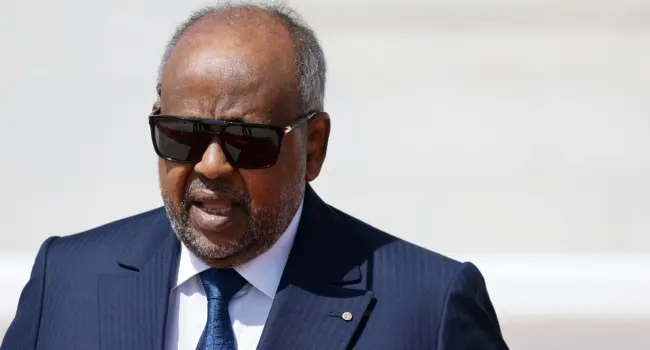Djibouti’s President Ismail Omar Guelleh, in power since 1999, will seek a sixth term in next year’s election, political sources told AFP, after parliament removed a constitutional age limit that had previously barred him from running again.
The small Horn of Africa nation — strategically located on the Red Sea and home to military bases from the United States, France, China, Japan, and Italy — has long been considered a rare island of stability in a volatile region.
“He has agreed to be a candidate in next year’s presidential election. Everything went smoothly,” said National Assembly President Dileita Mohamed Dileita following a congress of the ruling People’s Rally for Progress (RPP).
The 77-year-old leader’s decision was confirmed to AFP by another participant at the congress, who requested anonymity. The presidency has not yet made an official announcement.
Guelleh joins a list of ageing African leaders — including Cameroon’s Paul Biya (92) and Ivory Coast’s Alassane Ouattara (83) — who have sought to extend their long rule.
His re-election, however, appears virtually assured. Guelleh won the 2021 presidential poll with 97 percent of the vote, while his coalition, the Union for the Presidential Majority, dominates parliament. The International Federation for Human Rights (FIDH) has described Djibouti’s elections as “not free.”
The decision to run comes days after parliament voted to abolish the 75-year age limit for presidential candidates, the latest in a series of constitutional revisions that have paved the way for Guelleh’s continued rule. In 2010, lawmakers scrapped the two-term limit for presidents.
Djibouti regularly faces criticism from rights groups for suppressing dissent. The country ranks 168th out of 180 in Reporters Without Borders’ 2025 World Press Freedom Index, with the watchdog noting that “the media landscape is completely controlled and limited almost exclusively to state media.”
‘Everything is perfect’
Guelleh, who succeeded independence leader Hassan Gouled Aptidon in 1999 after serving as his chief of staff for 22 years, had already hinted at another run. In a May interview with The Africa Report, he said he would not make any decision that could “divide the country.”
“All I can tell you is that I love my country too much to embark on an irresponsible adventure and be the cause of divisions,” he said.
Responding to speculation about his health, Guelleh admitted he “probably” needed to “lose a few pounds.” “Otherwise, everything is perfect,” he added.
Home to just over one million people, Djibouti occupies a strategic position along the Bab el-Mandeb Strait, a crucial maritime chokepoint linking the Red Sea and the Gulf of Aden — a location that has made it a key player in global trade and military logistics.
AFP


